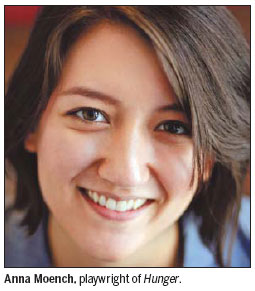People
Burial bride tradition granted dramatic revival
Updated: 2011-07-05 07:58
By Kelly Chung Dawson (China Daily)

In the Loess Plateau region of Shanxi province, the parents of unmarried sons who died early deaths have been known to pay dowries to the parents of dead daughters in hopes of buying rest for lonely souls.
When New York-based playwright Anna Moench read about the practice three years ago, she was moved to write Hunger. There was a reading of the play on June 22 at The Public Theater in Manhattan.
Directed by Eric Ting and inspired in part by China's rash of school stabbings in recent years, the play tells the story of a farming couple whose son committed murder and then suicide.
True to the area's folklore, the son has three souls, two of which continue to haunt the living with increasing urgency, forcing the parents to go in search of a burial bride.
Although the reading featured only actors, the final production was written with large- and small-scale puppets in mind.
The living characters in the play will be portrayed by puppets, while the souls of the characters will be played by live actors.
Moench, who is half Chinese and half German-American, traveled to Shanxi province for research with a grant from the Jerome Foundation. As an American with ties to China, she felt drawn to write about burial weddings, both for its uniqueness to China and how the tradition conveys the universal theme of grief, she says.
"When I read about this practice for the first time, what struck me was how much it says about the depths of people's grief," she says. "These rural people use their life savings in a huge material sacrifice for a supernatural, possibly not real, return. It says so much about the strength of tradition and the depths of people's love for their children, and how profoundly they grieve. I found it incredibly moving."
The practice is not well-known outside of the area. But within the Loess Plateau region, Moench says the tradition still thrives. It is rooted in both love and fear of what restless spirits are capable of doing, she says.
"I found the relationship with the dead very interesting," she says. "The ghost will not hesitate to haunt you and make terrible things happen to you if you don't take care of loose ends for them."
As an American who grew up in Baltimore, Moench struggled with the responsibility of presenting an accurate portrayal of a culture that feels both foreign and familiar to her, she says. While she identifies most as an American, her mother's Chinese family has been very influential in shaping her character.
"I didn't want to simply be an American writer writing about China because it's exotic," she says. "I felt a tremendous responsibility to learn as much as possible about this practice, and about China today - and not just a Western idea of what China is.
"By growing up completely exposed to two cultures, I realized that you can be fully American and fully Chinese. It seems paradoxical, but at the same time, from a personal experience it makes total sense."
Finding voices for the characters in Hunger was a challenge, she says. Many playwrights and writers who attempt to portray characters from another culture will fall into the trap of presenting their voices in a heightened, formal manner, she says.
"When I was trying to write these voices, I realized that there were many similarities between these rural people I'd met during my travels and the type of people in agricultural, rural US," she says. "These American are also facing the same economic problems that Chinese farmers are having. Something about the way these two cultures talk, their stoicsm about life, there was a resonance for me. I decided to write these Chinese characters with the voices of the people I'd come across in Minnesota and Wisconsin and in other farming areas."
New York audience members responded well to the reading, some calling attention to the universal themes despite its thoroughly Chinese context.
Perri Yaniv, an audience member who is involved in the theater industry, praised Moench for the world she created.
"The story was not just geographically specific, but emotionally and spiritually specific," he says. "It felt true, and unique."
Moench is looking for a theater to invest in her play, which is still in development. Working with puppets, and figuring out the logistics of how to use the puppets, will give her greater freedom to tell the story with imagery and poetry, she says.
China Daily

Specials

90th anniversary of the CPC
The Party has been leading the country and people to prosperity.

My China story
Foreign readers are invited to share your China stories.

Green makeover
Cleanup of Xi'an wasteland pays off for ancient city